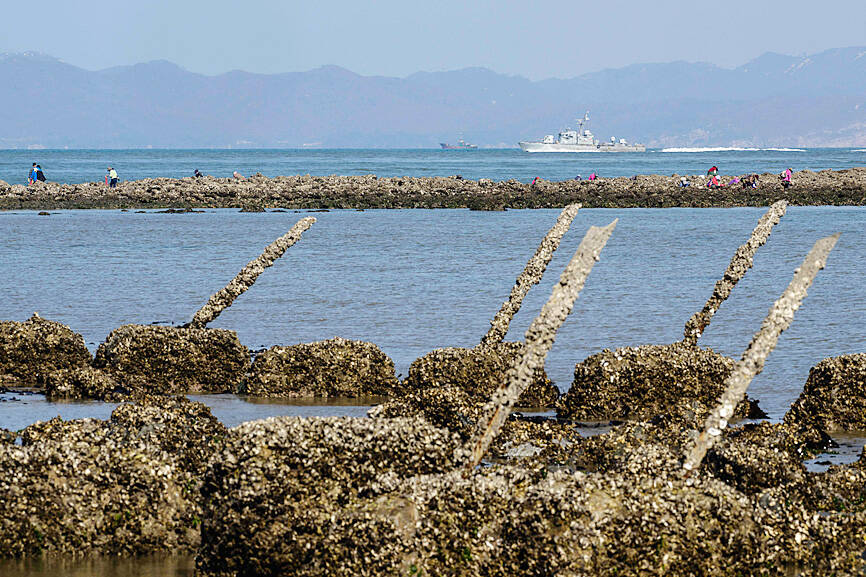South Korea’s president yesterday called for stronger air defenses and high-tech stealth drones, while the military apologized for failing to shoot down North Korean drones that crossed the border for the first time in five years.
South Korea’s military on Monday scrambled warplanes and attack helicopters, but they failed to bring down any of the North Korean drones, which flew back home or disappeared from South Korean radars.
It raised questions about South Korea’s air-defense network at a time when tensions remain high over North Korea’s missile tests this year.

Photo: AFP
“We have a plan to create a military drone unit tasked with monitoring key military facilities in North Korea, but we’ll advance the establishment of the drone unit as soon as possible because of yesterday’s [Monday’s] incident,” South Korean President Yoon Suk-yeol said during a regular Cabinet Council meeting. “We’ll also introduce state-of-the art stealth drones and bolster our surveillance capability.”
South Korea’s military needs more intensive readiness and exercises to cope with threats posed by North Korean drones, he said.
Lieutenant General Kang Shin-chul, chief director of operation at the South Korean Joint Chiefs of Staff, said in a televised statement that the military feels sorry because of its failure to shoot down the North Korean drones and for causing public concern.
South Korea lacks capacities to detect and strike small surveillance drones with a wingspan of less than 3m, although it has assets to spot and bring down bigger combat drones, Kang said.
South Korea will establish drone units with various capacities and aggressively deploy military assets to shoot down enemy drones, he said.
A front-line county office in South Korea yesterday sent emergency text messages notifying residents of a new batch of North Korean drones, but the military later said that it was a flock of birds.
On Monday, South Korea sent its own surveillance assets, apparently uncrewed drones, across the border as corresponding steps against the North Korean drone flights.

CRITICAL MOVE: TSMC’s plan to invest another US$100 billion in US chipmaking would boost Taiwan’s competitive edge in the global market, the premier said The government would ensure that the most advanced chipmaking technology stays in Taiwan while assisting Taiwan Semiconductor Manufacturing Co (TSMC, 台積電) in investing overseas, the Presidential Office said yesterday. The statement follows a joint announcement by the world’s largest contract chipmaker and US President Donald Trump on Monday that TSMC would invest an additional US$100 billion over the next four years to expand its semiconductor manufacturing operations in the US, which would include construction of three new chip fabrication plants, two advanced packaging facilities, and a research and development center. The government knew about the deal in advance and would assist, Presidential

‘DANGEROUS GAME’: Legislative Yuan budget cuts have already become a point of discussion for Democrats and Republicans in Washington, Elbridge Colby said Taiwan’s fall to China “would be a disaster for American interests” and Taipei must raise defense spending to deter Beijing, US President Donald Trump’s pick to lead Pentagon policy, Elbridge Colby, said on Tuesday during his US Senate confirmation hearing. The nominee for US undersecretary of defense for policy told the Armed Services Committee that Washington needs to motivate Taiwan to avoid a conflict with China and that he is “profoundly disturbed” about its perceived reluctance to raise defense spending closer to 10 percent of GDP. Colby, a China hawk who also served in the Pentagon in Trump’s first team,

SEPARATE: The MAC rebutted Beijing’s claim that Taiwan is China’s province, asserting that UN Resolution 2758 neither mentions Taiwan nor grants the PRC authority over it The “status quo” of democratic Taiwan and autocratic China not belonging to each other has long been recognized by the international community, the Mainland Affairs Council (MAC) said yesterday in its rebuttal of Beijing’s claim that Taiwan can only be represented in the UN as “Taiwan, Province of China.” Chinese Minister of Foreign Affairs Wang Yi (王毅) yesterday at a news conference of the third session at the 14th National People’s Congress said that Taiwan can only be referred to as “Taiwan, Province of China” at the UN. Taiwan is an inseparable part of Chinese territory, which is not only history but

INVESTMENT WATCH: The US activity would not affect the firm’s investment in Taiwan, where 11 production lines would likely be completed this year, C.C. Wei said Investments by Taiwan Semiconductor Manufacturing Co (TSMC, 台積電) in the US should not be a cause for concern, but rather seen as the moment that the company and Taiwan stepped into the global spotlight, President William Lai (賴清德) told a news conference at the Presidential Office in Taipei yesterday alongside TSMC chairman and chief executive officer C.C. Wei (魏哲家). Wei and US President Donald Trump in Washington on Monday announced plans to invest US$100 billion in the US to build three advanced foundries, two packaging plants, and a research and development center, after Trump threatened to slap tariffs on chips made